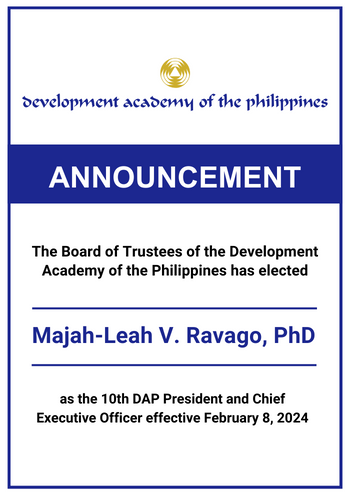
The Development Academy of the Philippines (DAP), through its Center for Governance (CFG), conducted the Course on the Basic Policy Process last October 28-30, 2019 at the DAP Building in Pasig City. The training was attended by 46 participants from different national government agencies, government-owned and controlled corporations, local government units, and the private sector.
The three-day course aimed to build and strengthen the capacities of the participants in developing and crafting policies, which are geared toward fulfillment of their mandate. At the end of the course, participants were expected to better understand the theoretical underpinnings and components of the policy process as well as the range of tools and techniques for policy development.
The lectures were delivered by the following resource persons: Mr. Jalton G. Taguibao, Assistant Professor of the University of the Philippines-Diliman Political Science Department and CIDS Program on Data Science for Public Policy; Ms. Jamie Lyn Daileg, Legislative Staff Officer V at the Senate Economic Planning Office of the Senate of the Philippines and Secretary of the Lee Kuan Yew School of Public Policy Alumni Association – Philippines Chapter; Ms. Emmarita Z. Mijares, an independent consultant of the United States Agency for International Development (USAID) Regulatory Reform Support Program for National Development; and Mr. Gilbert Lumantao, Director of the CFG Policy Research Office, and Dr. Alan S. Cajes, Vice President and Managing Director of the Corporate Concerns Center (CCC), from the Development Academy of the Philippines. All of them shared their knowledge and expertise on policy studies.
During the last day of the training, the participants developed their respective policy papers with themes ranging from health, disaster risk management, housing, e-government, education, reclamation, migration, and traffic management. The policy papers were presented in a panel session for feedback and comments from Director Gilbert Lumantao, Assistant Professor Jalton G. Taguibao, Ms. Jamie Lyn Daileg, and Ms. Katrina Miradora, former consultant of the Asian Development Bank.
For this year, the most promising policy papers were from participants of the Climate Change Commission and KILUS entitled Addressing Pluvial Flooding in Metro Manila, and from the Department of Foreign Affairs and Department of Labor and Employment entitled Protecting the Rights of Filipinos Everywhere: Mitigating the Exploitation of Filipino Migrant Workers. – Hilary Martinez




